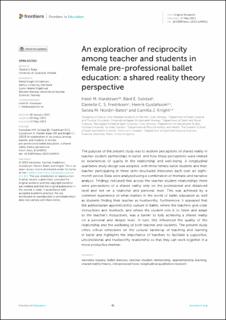| dc.contributor.author | Haraldsen, Heidi Marian | |
| dc.contributor.author | Solstad, Bård Erlend | |
| dc.contributor.author | Gustafsson, Henrik | |
| dc.contributor.author | Nordin-Bates, Sanna M. | |
| dc.contributor.author | Fredriksen, Danielle C. S. | |
| dc.contributor.author | Knight, Camilla J. | |
| dc.date.accessioned | 2023-10-17T08:16:03Z | |
| dc.date.available | 2023-10-17T08:16:03Z | |
| dc.date.created | 2023-05-06T11:27:51Z | |
| dc.date.issued | 2023 | |
| dc.identifier.citation | Frontier in Education. 2023, 8, Artikkel 1148922. | en_US |
| dc.identifier.issn | 2504-284X | |
| dc.identifier.uri | https://hdl.handle.net/11250/3096883 | |
| dc.description | This is an open-access article distributed under the terms of the Creative Commons Attribution License (CC BY). The use, distribution or reproduction in other forums is permitted, provided the original author(s) and the copyright owner(s) are credited and that the original publication in this journal is cited, in accordance with accepted academic practice. No use, distribution or reproduction is permitted which does not comply with these terms. | en_US |
| dc.description.abstract | The purpose of the present study was to explore perceptions of shared reality in teacher-student partnerships in ballet, and how these perceptions were related to experiences of quality in the relationship and well-being. A longitudinal qualitative study design was adopted, with three female ballet students and their teacher participating in three semi-structured interviews each over an eight-month period. Data were analyzed using a combination of thematic and narrative analysis. Findings indicated that across the teacher-student relationships there were perceptions of a shared reality only on the professional and distanced level and not on a relational and personal level. This was achieved by a common experience of what matters in the world of ballet education as well as students finding their teacher as trustworthy. Furthermore, it appeared that the authoritarian apprenticeship culture in ballet, where the teachers give clear instructions and feedback, and where the student role is to listen and adapt to the teacher’s instructions, was a barrier to fully achieving a shared reality on a personal and deeper level. In turn, this influenced the quality of the relationship and the wellbeing of both teacher and students. The present study offers critical reflections on the cultural backdrop of teaching and learning in ballet and highlights the importance of teachers to facilitate a supportive, unconditional, and trustworthy relationship so that they can work together in a more productive manner. | en_US |
| dc.language.iso | eng | en_US |
| dc.subject | apprenticeship learning | en_US |
| dc.subject | ballet dancers | en_US |
| dc.subject | interpersonal trust | en_US |
| dc.subject | longitudinal qualitative research | en_US |
| dc.subject | narrative inquiry | en_US |
| dc.subject | shared reality theory | en_US |
| dc.subject | teacher-student relationship | en_US |
| dc.title | An exploration of reciprocity among teacher and students in female pre-professional ballet education: A shared reality theory perspective | en_US |
| dc.type | Peer reviewed | en_US |
| dc.type | Journal article | en_US |
| dc.description.version | publishedVersion | en_US |
| dc.rights.holder | © 2023 Haraldsen, Solstad, Fredriksen, Gustafsson, Nordin-Bates and Knight | en_US |
| dc.source.pagenumber | 12 | en_US |
| dc.source.volume | 8 | en_US |
| dc.source.journal | Frontiers in Education | en_US |
| dc.identifier.doi | 10.3389/feduc.2023.1148922 | |
| dc.identifier.cristin | 2145939 | |
| dc.description.localcode | Institutt for idrett og samfunnsvitenskap / Department of Sport and Social Sciences | en_US |
| dc.source.articlenumber | 1148922 | en_US |
| cristin.ispublished | true | |
| cristin.fulltext | original | |
| cristin.qualitycode | 1 | |
